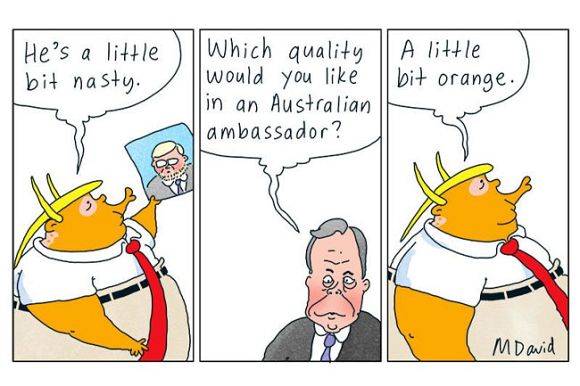The immorality of X (formerly Twitter) – and its refusal to fully take down footage of the Wakeley church stabbing – echoes the unethical misinformation of the Australian mainstream press, Dr Victoria Fielding writes.
IN THE WAKE of the Government and regulator’s debate with X's (formerly Twitter) Elon Musk about the take-down of footage of Bishop Mar Mari Emmanuel being stabbed and the resurrection of misinformation laws, it’s time we stopped focusing only on the ills of social media and started recognising deliberately misleading, manipulative messages are platformed on all type of media — including mainstream media.
Mainstream media should be the platforms we are equally worried about because they have a much larger, more powerful influence on society.
Any regulation that focuses on social media without addressing manipulative content on mainstream news media just incentivises the already powerful mainstream media to continue to further undermine Australian democracy.
Discussing the rapid spread of disinformation during the Bondi Junction attack and the Wakeley church stabbing, Phil Coorey – on ABC's Insiders – said that social media is “a law unto itself”.
This is, he said, as opposed to “all of us here” – mainstream news organisations – who are bound by “defo rules and everything else, and you know basic decency”.
Regular readers of this column will have pictured me guffawing when Coorey suggested mainstream media is bound by basic decency. As pointed out by Dave Milner, Channel 7 used disinformation posted on social media to incorrectly name the Bondi Junction killer, which has landed it a defamation case.
Yes, the false name was circulating on social media first, but this naming was legitimised and broadcast to a much larger audience by Channel 7, thus having a more profound impact.
The behaviour of some journalists on social media is also a problem. For example, as the Bondi Junction stabbing attack unfolded, Julia Hartley-Brewer a “journalist” at Murdoch’s UK angertainment outlet, TalkTV, called the attacker an “Islamist terrorist”.
She didn’t retract this disinformation until the next day, saying she was too busy to do so before then. This mis-characterisation of the attacker was of course not an accident, it was a politically and racially-motivated false allegation.
Such examples are among thousands more, showing members of the mainstream media constantly break basic standards of decency.
Just in the last year, this reporter has written about much indecent behaviour amongst Australia’s largest media organisations, capturing the tip of a very large iceberg, including:
- News Corp’s Fox News being sued by Dominion for promoting Trump’s big election lies;
- News Corp’s poisoning of the Voice referendum debate and support for the ‘No’ campaign, including platforming lies and misinformation, thus increasing calls for a Royal Commission;
- News Corp reaping huge revenues from Andrew Bolt’s racism; and
- Australian media’s weaponisation of Brittany Higgins’ rape allegations against anyone who supported her and Channel 7’s 'Spotlight' disgraceful financial and narrative support for rapist Bruce Lehrmann.
The problems of mainstream media do not erase the problems of social media, which absolutely has its issues – the death of civil discourse being a major one. But mainstream news media’s critique of social media would be easier to take seriously if it bothered to apply the same standards to its own institution.
When journalists pan social media without equally dissecting the problems within their own industry – often in their own organisations – they are not only hypocritical but are quietly endorsing behaviour that hurts their whole profession.
It would also be easier to accept mainstream media’s assessment of social media if it was criticising these organisations for the right reasons. If, say, journalists were really worried about the spread of disinformation on social media, why do they not spend more time fact-checking and correcting manipulative narratives?
Instead, we too often see narratives take hold on social media, only to be amplified – without verification – by mainstream media.
If they were honest, journalists would admit their dislike of social media has far more to do with a battle for advertising dollars and their resentment of giant platforms pulling out of the Digital Media Code by refusing to share their revenue with them.
Mainstream news media’s bitterness is also not only with the platforms themself but with social media audiences. There is no doubt that many journalists hate that social media gives audiences the means by which to talk back.
Any attempt to regulate misinformation and disinformation – an admittedly incredibly difficult regulatory area to police – needs to include better standards of decency, accuracy, accountability, and public value for all types of media, including mainstream media.
When mainstream media piles on to social media, it’s clear that it is just hoping the government will “look over there” rather than at it.
Dr Victoria Fielding is an Independent Australia columnist. You can follow Victoria on Twitter @DrVicFielding.
Related Articles
- Murdoch article drums up hysteria with factual errors
- 'False balance': Media has a responsibility to call out lies in U.S. and UK elections
- News Corp has no shame in having no standards
- Murdoch propaganda machine catastrophic for democracy
- News Corp's war on 'Albo's Voice'
 This work is licensed under a Creative Commons Attribution-NonCommercial-NoDerivs 3.0 Australia License
This work is licensed under a Creative Commons Attribution-NonCommercial-NoDerivs 3.0 Australia License
Support independent journalism Subscribe to IA.















